St. Joseph’s Health Centre staff awarded for their commitment to our shared values
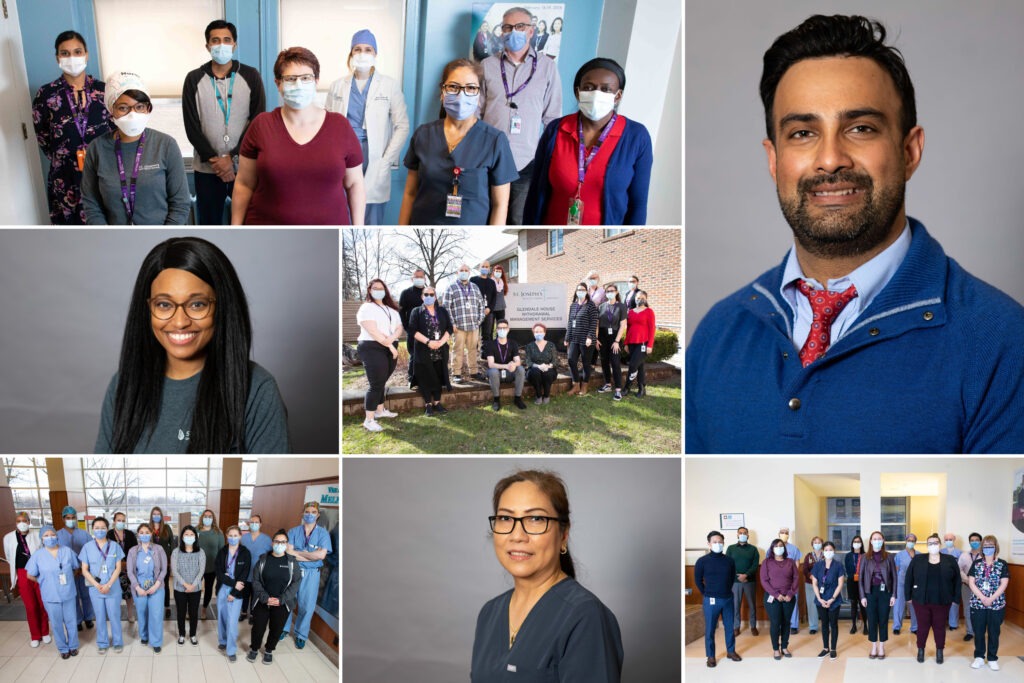
On St. Joseph’s Feast Day, Unity Health Toronto recognized staff, physicians, learners, volunteers and patient and family partners who exemplify a commitment to the network’s values of Community, Compassion, Excellence, Human Dignity and Inclusivity.
Our Shared Values Awards were presented by Dr. Tim Rutledge, President and CEO of Unity Health; Dale Clement, Vice President of Clinical Programs; Dr. Kunuk Rhee, Vice President, Medical Affairs, St. Joseph’s; and Christopher De Bono, Executive Director of Mission, Values and Spiritual Care. More than 120 people gathered online to see the recipients receive their awards. Here are some of their stories, in the words of those who nominated them.
Glendale House
Winner of the Human Dignity Award for an individual or team who affirms that every person has sacred value and is worth of respect.
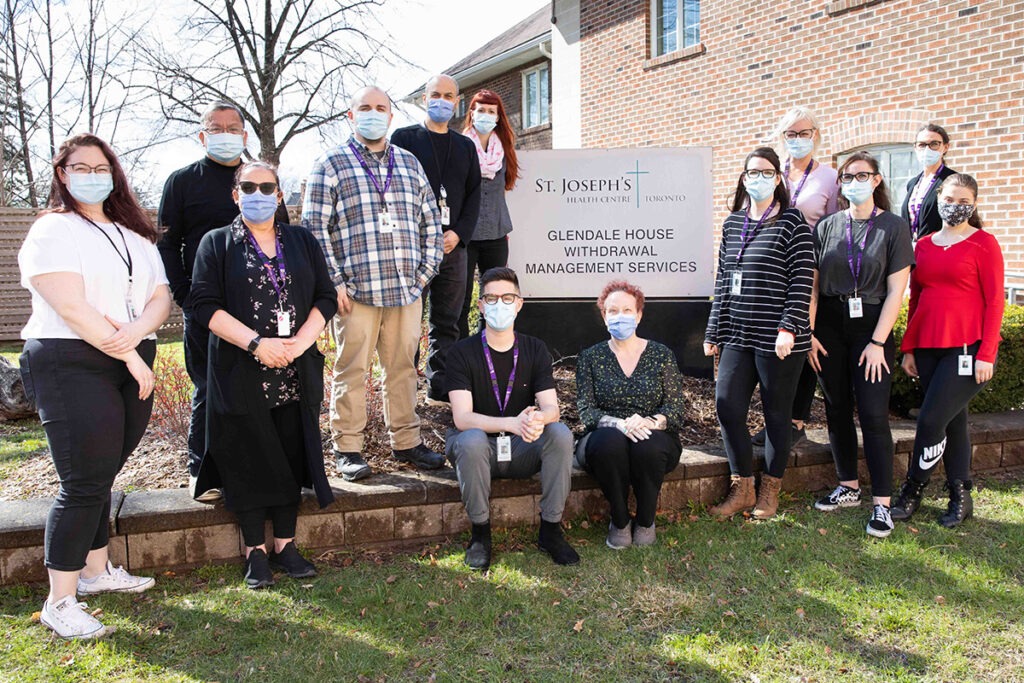
Every client that enters Withdrawal Management Services has a story and just wants to be heard. The team at Glendale House takes the time to build a therapeutic relationship with every client by acknowledging the pain and suffering, providing support and actively listening to the needs and feelings of the person sitting in front of them.
The team understands that there is no one-size fits all approach to treating clients with addictions and they work by meeting the client where they are at, to identify and understand their needs. They take the time to truly listen to a client’s story, express empathy and always present with a positive and supportive attitude.
Many who come to this service come afraid, struggling, and without hope. Due to the way their human dignity is affirmed at Glendale House, they leave feeling that there are other options and life paths they can take.
Ricky Bhardwaj
Medical Imaging Area Coordinator
Winner of the Compassion Award for an individual or team that enables health and healing by understanding each person’s needs and by providing care with kindness and sensitivity.
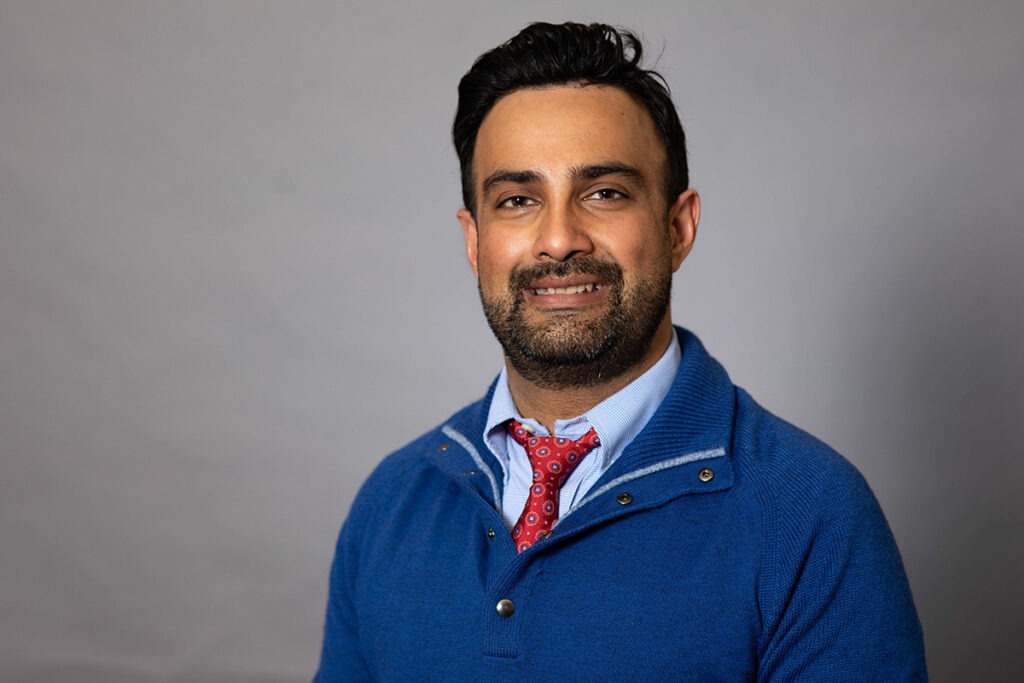
Ricky has an important role as the liaison between Diagnostic Imaging and Emergency in which he arranges patient imaging and prep for exams. The person in this role is, at minimum, required to inform patients of their exam time and direct patients to where to go for the exam. Ricky’s version of this role is much more robust.
Many of the patients Ricky interacts with have been waiting hours in Emergency and are agitated, frustrated, or unhappy. Ricky ensures patients are comfortable and that they make their diagnostic appointments in a timely manner, even personally escorting them to DI if needed to ensure they don’t get lost and continue to feel supported. He listens to patients, answers their questions, and gives them frequent updates.
I have seen Ricky happily wait with nervous patients as they have their tests, hearing them say that without him, they would not be able to have the exam done due to their anxiety. During this, he is still responsible for coordinating other patient’s exams and balances his role effectively, answering his IP phone for one patient’s coordination, while holding the hand of another.
Critical Care Team
Winner of the Excellence Award for an individual or team who strives to achieve the best care and quality through innovation and continuous improvement
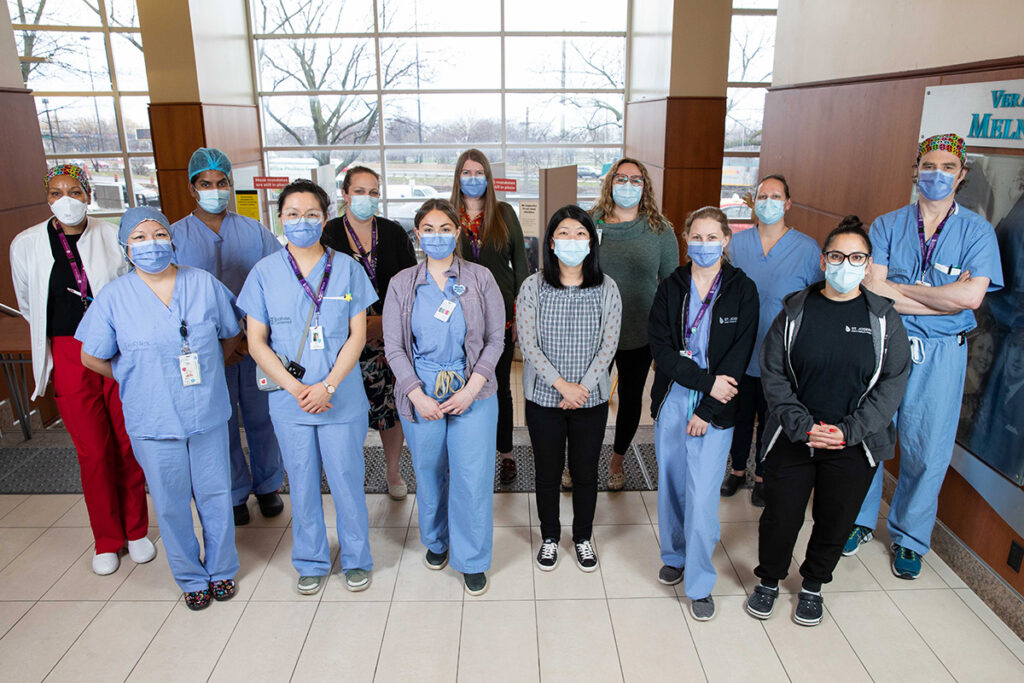
Like many of our counterparts across the health care system, part of our pandemic planning at Unity Health was to prepare for the possible surge of patients as well as possible staff shortages that may occur. A cornerstone of this preparation was the implementation of Team-Based Pandemic Pod Models in the Critical Care department at St. Joseph’s Health Centre. Pandemic Pods are staffing models comprised of interprofessional health care providers (HCPs) who provide care for a group of patients cohorted into a pod.
Since this was a new endeavor at Unity Health, we worked closely with the Critical Care staff and educators to design and test the Pandemic Pod model prior to implementation at the bedside using our simulation team to understand process, environment, and team dynamics. The Critical Care team helped us understand each HCPs’ role and responsibility during the transfer of accountability process and patient care surrounding the completion of a head-to-toe assessment and management of a deteriorating patient. The use of simulation, tabletop and in-situ, to design and test models of care was a new and innovative approach at St. Joseph’s. Rather than worry, the team trusted one another and worked to develop and implement a crisis standard that ensured a continued critical focus on top priority items for all patients, creating a balanced workload and ensuring continued quality. By adapting to the needs of their patients on every level, the team distinguished themselves and left an important legacy of work behind.
Jazmyn Kent, Marilou Bernardo and the Mohs Micrographic Surgery Team
Winners of the Community Award for an individual or team that embraces diversity, trust, joy and teamwork to fulfill human potential
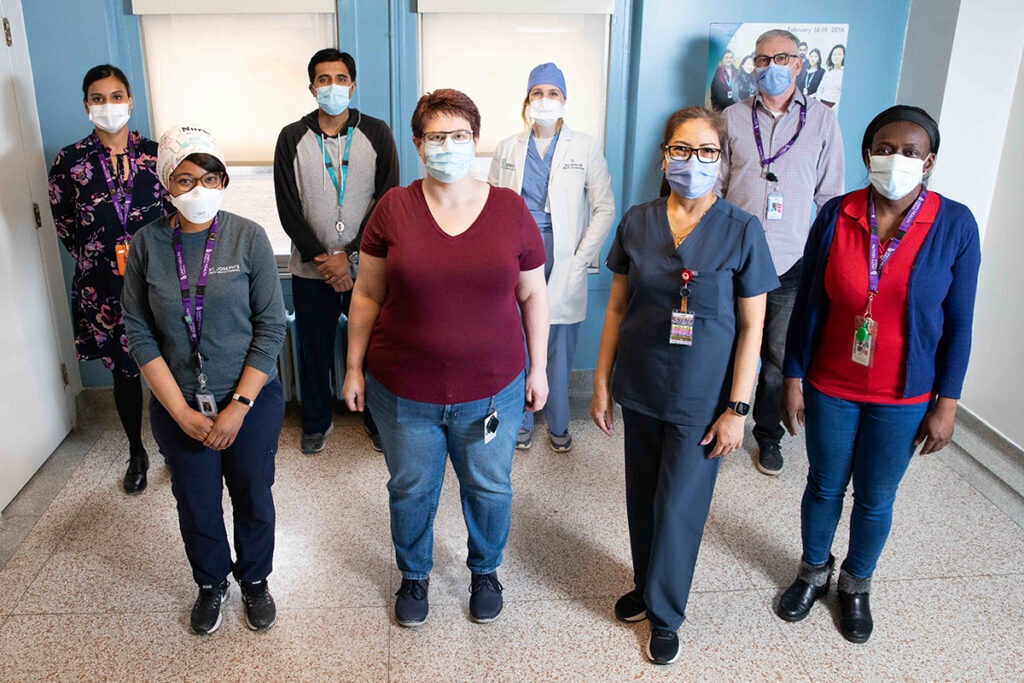
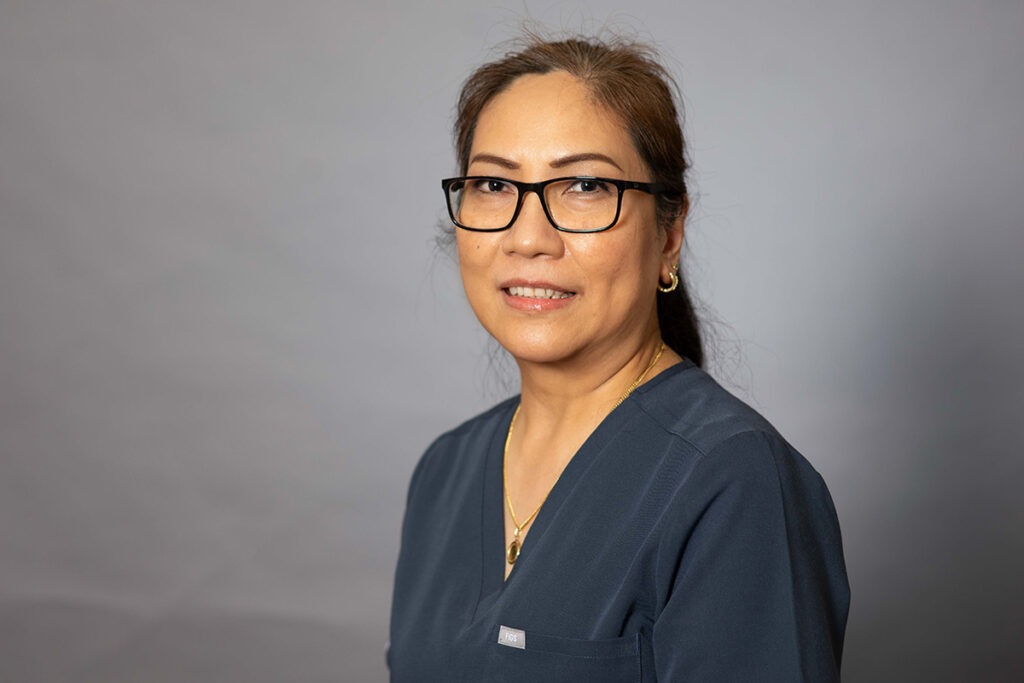

All members of the team are deserving of this nomination and award. All members of the Mohs team work together to support each other which allows us all to do our best for our patients every day.
For example, when Jazmyn has to spend extra time with a patient to ensure they understand their post-operative discharge instructions, Marilou will help to bandage the next patient who is patiently waiting and reload the next procedure room. When Marilou is busy managing biopsy specimens and cannot respond to a transport page, Gagan, Victoria, or Janet will bring the slides up to the 3 East clinic space. When our administrators have their phones ringing off the hook all day, Jazmyn will call patients back for appointment questions. Every member of the Mohs team recognizes the needs of each other. By seeing the bigger picture, beyond their own daily roles and tasks, and by supporting their colleagues, they create a supportive atmosphere. This respect for community, which is so innate to every single team member, allows the Mohs team to provide dignified, compassionate, excellent, and inclusive care for our patients, and for each other.
Surgical Program
Winner of the Inclusivity Award for an individual or team that fosters an inclusive, welcoming environment where everyone is treated equitably and without judgment.
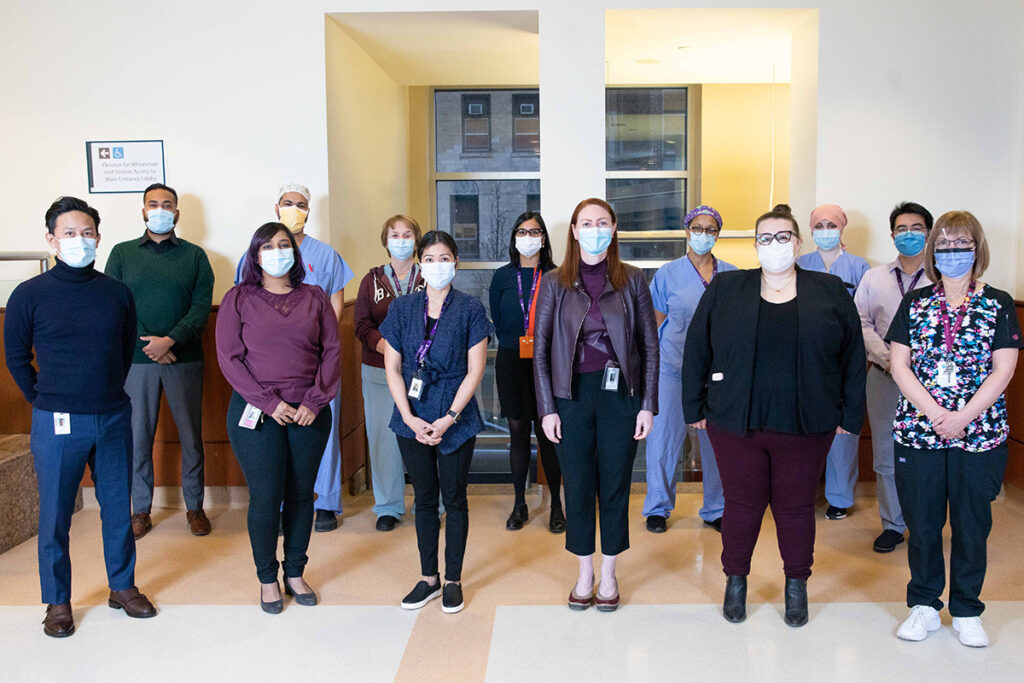
The program has established a Surgical EDI committee so that we can understand, appreciate, and learn from each other’s differences as well as our patients. The operating room has a digital communication board that features Indigenous awareness, Black History Month education, and other celebrations and initiatives in order to increase cultural awareness within the perioperative space. The Surgical program leadership also participates in an EDI Book Club, and support one another through challenging discussions and shared experiences.
In an effort to increase inclusion of families within the surgical journey, the program has installed a patient tracking monitor in the cafeteria so that families can see where their loved ones are located. Families can leave the second floor to get something to eat and/or drink and are still able to visually follow their loved ones. This implementation has improved the communication between the staff and families, while protecting patients’ privacy and providing families with an alternate communication tool.
The team also lives inclusivity by recognizing every patient and colleague as an individual, asking patients which pronoun they prefer for the team to use, and being respectful of language and cultural diversities. They engage Patient and Family Partners to participate in many aspect of their work including PFP presentations in surgical team discussion and PFPs assisting in educating staff on how to establish effective and supportive collaborative care.
By: Jessica Cabral
